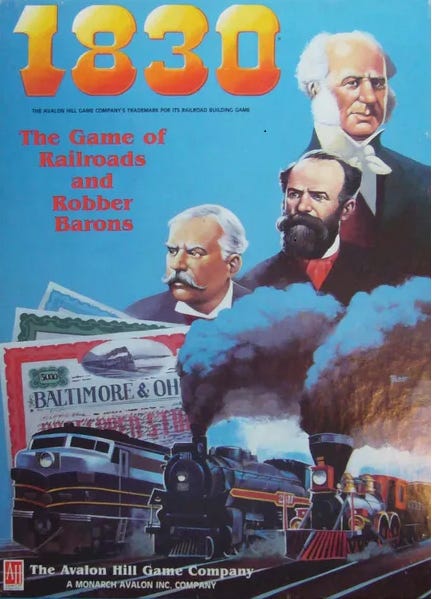In my first game of 1830, I went bankrupt. As per the rules, this triggered the end of the game and the other players tallied up their cash and the value of the stock. I assume someone won. I don’t remember. All I know is that I had started with $600 — quite the amount given the date — and ended with more liabilities than assets.
In my second game …. I also went bankrupt.
After a few more games, I didn’t bankrupt. I’d made money. Less money than all the other players, granted. I was only worth three or four thousand dollars. Victory! Still in last place, but it was a victory.
1830 wasn’t the first game in the series that became known as ‘18xx,’ the first was 1829 by Francis Tresham. But — like many complex strategy games coming out of the U.K., the people at Avalon Hill noticed it and liked it; but not enough to make a straight reprint. I’m not sure what 1829 lacked, but Bruce Shelley added to the rough and tumble of the U.S. Robber Baron age to Tresham’s design.
18xx isn’t the first stock market game where the stocks had underlying value (and neither was Acquire), but it is the earliest game I’m aware of where a company could be raided. During each of the Operational phases of the game, a company does train things: building track & stations, buying trains. It also makes money and pays dividends — or not — to shareholders. All these decisions are made by the President.
Critically — trains become obsolete (the “rust”) and a company without a train must purchase one … and if they are short of cash, the President pays the difference out of his own pocket.
Sometimes I went bankrupt as the minority shareholder, watching the president allow another company to buy a company’s trains for $1 and then selling his shares, leaving me as the president to fix up the mess. Later I went bankrupt not through any robber baron shenanigans, just by not having saved enough assets in a company (or two) to handle trains rusting earlier than I expected.
Many modern games are kind. Someone wins and the others lose; but everyone makes money. Die in a video game? Respawn …. after a 10 second punishment. A few modern videogames have “Permadeath” where dying means starting from scratch. Ending an hours long session because you went bankrupt is the board game equivalent.
But — like Kennedy exhorting the U.S. to go to the moon — we like some games not because they are easy, but because they are hard. They do not spoon feed us strategy tips, nor give us points no matter which action we take or sets we collect. I’m not sure of all of the reasons 18xx became a genre. Some people adore games involving trains, and part of the draw is seeing which companies started where. For me, going broke multiple times was harsh, but intriguing.
There are nearly 3001 titles in the “series,” and that number grows. Some games have the same rules and only the geography changes. Other 18xx games have differences that reflect historical differences, or different financial systems. The series is so numerous that all the years are taken! New games have names like 1822PNW, 1822CA and 1822MX that show the ‘branch’ of 18xx genealogy (the ‘22 family) and location (Pacific Northwest, California, Mexico). The entire world is covered, and the asteroid belt (in 2038) and the moon (in 21Moon). Even before the proliferation of titles, 1830 made a huge impact in PC gaming as the inspiration for Railroad Tycoon, published a mere four years after 18302.
Those three hundred titles show the depth of 18xx’s appeal, but admittedly the game has a narrow fan base. In some ways, 18xx is like Horror Movies, an acquired taste that doesn’t promise a happy ending. Most people avoid them, but there are plenty of true fans who want to appreciate each one. Designers have taken a crack at mixing 18xx with European game sensibilities, such as the recent City of the Big Shoulders.
18xx keeps chugging along and shows no sign of stopping.
Personally, this makes 1830 a first ballot entry into the 20th Century Project. This also shows the value of waiting, because in 2001 it wouldn’t not have been clear. But just as my first games ended in bankruptcy, 18xx is not a series that is easy to appreciate in a single session.
If you would like to try 18xx
If the above is enticing, I suggest starting out with Tom Lehmann’s 1846, which was designed to be more approachable while still being interesting for veterans3. You can also play (or watch) on 18xx.games.
What do you think? Let me know in the comments below and/or take the poll on Boardgame Geek.
Reading Sid Meier’s notes in the accompanying rulebook was the first time I ever heard of 1830.
Full Discloser — Tom Lehmann is a friend. But ‘46 is what I personally use to introduce new players. Bankruptcy is still possible, but much rarer and the game plays an hour or two faster.






The first game listed that wouldn't be in my first five selected, but likely it would show up in the next five. My first 18xx game was 1870. I did not go bankrupt, but I came in last. And continued to come in last for a couple of months. I played 1830 for the first time a few weeks after that first 1870 play. Bankrupt! And I kept wanting to go back for more because there was a clear presentation of progress.